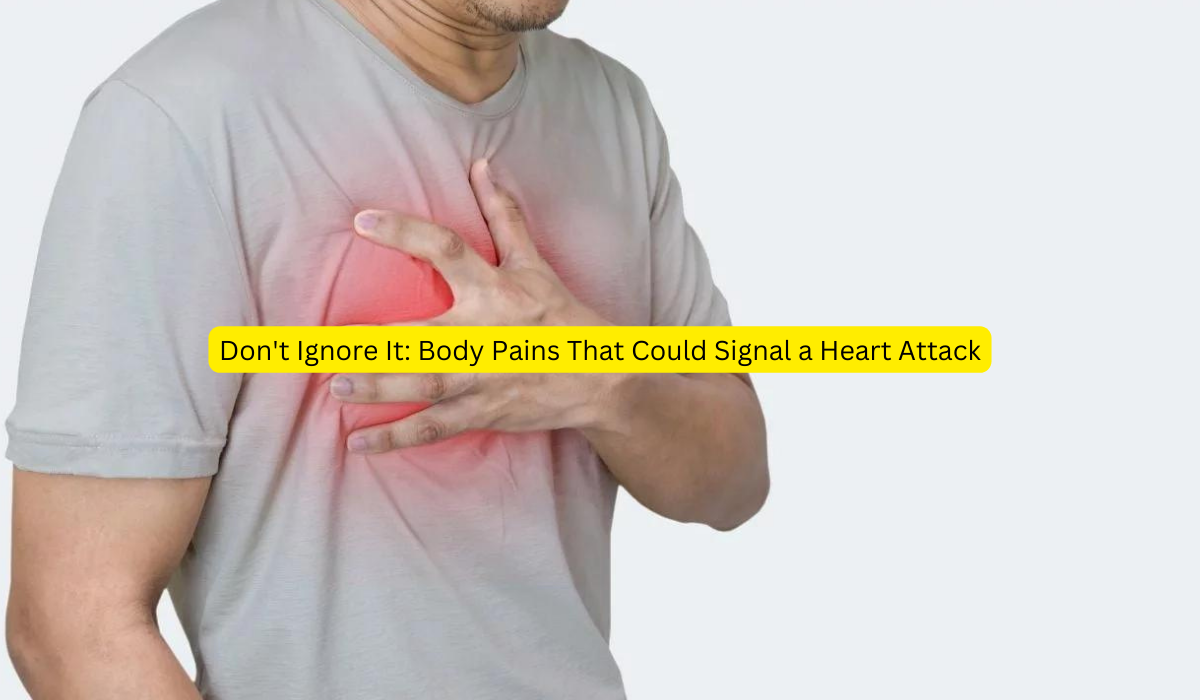Chest pain – it’s the classic symptom everyone associates with a heart attack. But what if the warning signs aren’t so clear-cut? Let’s face it, our bodies experience aches and pains all the time. But sometimes, a seemingly ordinary discomfort could be a silent scream from your heart, urging you to seek immediate medical attention. So, the question remains: which body pains should you never ignore when it comes to your heart health?
Beyond the Chest: Unveiling Hidden Heart Attack Symptoms
A heart attack occurs when blood flow to a part of your heart is blocked. This can cause severe pain, but not always in the chest. Here are some unexpected body pains that could signal a heart attack:
- Pain in the Arms, Back, Neck, or Jaw: Imagine the discomfort radiating outwards from your heart, like ripples in a pond. Pain in these areas, especially on the left side, could be a sign that your heart is struggling.
- Upper Belly Pain: This can feel like indigestion or heartburn, but don’t dismiss it as a simple stomach ache. Upper belly pain, particularly with nausea or vomiting, could be a red flag for a heart attack.
- Shortness of Breath: Feeling winded after climbing a flight of stairs is one thing, but sudden and persistent shortness of breath, even at rest, could indicate a heart attack, especially if accompanied by other symptoms.
Remember: Every body is different. Don’t compare your experience to others. If a pain feels unusual, intense, or persistent, and especially if accompanied by other symptoms, err on the side of caution and seek immediate medical attention.
Beyond Pain: Additional Warning Signs to Heed
While pain is a crucial indicator, a heart attack can manifest in other ways too:
- Lightheadedness or Dizziness: Feeling faint or dizzy, especially if coupled with other symptoms, could be a sign that your heart isn’t pumping blood effectively.
- Cold Sweat: A sudden outbreak of cold sweat, especially with no apparent reason, could be your body’s response to a heart attack.
- Extreme Fatigue: Feeling overwhelmingly tired for no reason could be a sign that your heart is struggling to keep up with your body’s demands.
Listen to your body! These seemingly unrelated symptoms, especially when occurring together, could be your heart’s way of calling for help.
When in Doubt, Get Checked Out!
Ignoring a potential heart attack can have devastating consequences. Here’s why immediate action is crucial:
- Time is Muscle: The sooner you receive treatment, the less damage to your heart muscle. Each minute counts!
- Minimizing Complications: Early intervention can significantly reduce the risk of complications like heart failure or arrhythmias.
- Peace of Mind: Even if it’s a false alarm, getting checked out provides peace of mind and allows for any underlying issues to be addressed.
Don’t hesitate! If you suspect a heart attack, call emergency services immediately. Minutes matter when it comes to heart health.
Know Your Risk Factors: Taking Control of Your Heart Health
While body pains can be warning signs, it’s equally important to understand your risk factors for heart attack:
- High Blood Pressure: Think of your blood pressure as the force of water rushing through a hose. Uncontrolled high blood pressure puts excessive strain on your heart.
- High Cholesterol: Imagine cholesterol like fatty deposits clogging a pipe. High cholesterol can narrow your arteries, reducing blood flow to your heart.
- Diabetes: This condition can damage blood vessels and nerves, increasing your risk of heart attack.
- Smoking: Smoking is a major culprit, directly damaging your heart and blood vessels.
- Family History: If close relatives have experienced heart attacks, your risk may be higher.
Knowledge is power! Understanding your risk factors allows you to take proactive steps towards a healthier heart.
Living Heart-Healthy: Taking Charge of Your Well-Being
By incorporating heart-healthy habits into your lifestyle, you can significantly reduce your risk of a heart attack:
- Eat a Balanced Diet: Focus on fruits, vegetables, whole grains, and lean protein. Limit saturated and unhealthy fats, added sugar, and sodium.
- Maintain a Healthy Weight: Carrying excess weight puts extra strain on your heart.
- Exercise Regularly: Aim for at least 150 minutes of moderate-intensity exercise per week.
- Manage Stress: Chronic stress can wreak havoc on your heart health. Find healthy ways to manage stress.
Frequently Asked Questions
1. I occasionally experience chest pain. Does that always mean I’m having a heart attack?
Not necessarily. Chest pain can have various causes, including muscle strain, anxiety, or heartburn. However, if the chest pain is severe, persistent, accompanied by other symptoms like shortness of breath, sweating, or dizziness, seek immediate medical attention. It’s always better to be safe than sorry.
2. I’m young and healthy, so I shouldn’t worry about heart attacks, right?
While heart attacks are more common in older adults, they can happen at any age. Risk factors like high blood pressure, high cholesterol, and diabetes can put younger individuals at risk. Maintaining a healthy lifestyle from a young age is crucial for long-term heart health.
3. Should I call emergency services if I experience any of the body pains mentioned in the article?
If the pain is severe, persistent, and accompanied by other symptoms like shortness of breath, sweating, or dizziness, call emergency services immediately. Early intervention can make a significant difference in a heart attack situation.
4. Can anxiety cause body pains that mimic a heart attack?
Yes, anxiety can manifest as physical symptoms like chest pain, shortness of breath, and sweating. However, if the pain is new, severe, or accompanied by other unusual symptoms, it’s crucial to seek medical attention to rule out a heart attack.
5. What can I do at home to reduce my risk of a heart attack?
There are many things you can do! Focus on eating a heart-healthy diet, exercising regularly, maintaining a healthy weight, managing stress, and getting enough sleep. If you smoke, quitting is one of the best things you can do for your heart health. Talk to your doctor about any concerns you have and create a personalized plan for a healthy heart.

